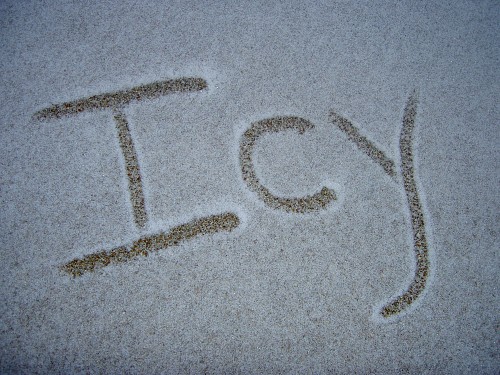Freeze Thaw Cycles: How They Hurt Homes
What are freeze thaw cycles? Although the northern United States is famous -- or infamous -- for extreme cold in winter, the weather is not uniformly frigid from December to April. Throughout the season, outdoor temperatures may dip way below 32 degrees and then rise again briefly. Occasional mild days are a welcome break for most people, but for your house it’s a different story. This continual cooling and warming action is described as "freeze thaw cycles," which can be very hard on components like concrete and plumbing.
Here are 3 ways freeze thaw cycles hurt homes (and humans!) and how to fight back.
Concrete Foundations, Driveways, Patios
Freeze thaw result: Concrete is used for outdoor structures such as house foundations, patio slabs, driveways, sidewalks, and walkways because it is so durable. However, concrete’s “kryptonite” is its porosity. On relatively warm days, it soaks up water from winter rains and snowmelt. When the temperature plummets, this water freezes and expands 9-10 percent, putting pressure on -- and potentially rupturing -- the structure of the concrete. The result? Cracking, crumbling, pitting, scaling (flaking or peeling), and even shifting.
Immediate fix: In the short term, keep snow under control. Shovel your driveway and patio regularly, and clear a 3-foot perimeter around your foundation. Sprinkle with a salt-based deicer to lower the precipitation’s freezing point. However because salt can also damage concrete, use only sparing amounts of concrete-friendly salts.
To-do before next winter: Protect surfaces with sealant specifically designed for concrete. If required, clean thoroughly and resurface. Repair foundation cracks and pile dirt or sand 10” deep around your foundation, sloping away from the house.
Sidewalk, Pathway, Steps
Freeze thaw result: In addition to the issues mentioned in the Concrete section (above), sidewalks, pathways, and steps made of any material may be affected by freeze thaw cycles in another way. As snow on these features melts and then refreezes, black ice often forms. Because this thin coating of ice is nearly transparent, it’s difficult to see, which makes it very dangerous – not to the structure of your home, but to people coming and going. Black ice is especially hazardous to anyone with limited mobility.
Immediate fix: Apply a deicer, avoiding any homemade deicing recipes that call for dish liquid (which tends to add to the slipperiness). Manually remove black ice if possible, as well as snow from future storms. Make sure steps and walks affected by black ice are well-lit at night.
To-do before next winter: Apply anti-skid strips or fiber matting to outdoor steps. Hire a landscaping service for regular snow removal from your property.
Plumbing
Freeze thaw result: Severe cold can cause your residential plumbing pipes to freeze … and even your toilet! While the latter sounds more dramatic and is definitely inconvenient, a toilet freeze won’t do any actual harm. Frozen plumbing pipes are what you really have to worry about. Or, to be precise, what happens when frozen pipes eventually un-freeze. If the pressure of water expanding as it froze has caused pipes to burst, once they thaw out that water will end up everywhere. So you’ll have water damage to deal with, as well as the need to repair or replace busted pipes.
Immediate fix: For a pipe that’s frozen but not burst, turn on the faucet it connects to, in order to relieve pressure. Working from the faucet down toward the frozen section, gently thaw the pipe. Wrap the pipe in makeshift hot compresses – old sheets or towels moistened with hot water – and position a space heater and/or infrared lamp nearby (if the pipe is inaccessible, place the heater or lamp next to the adjacent wall. Never use any open flame around plumbing pipes.
For busted pipes, shut off your main water valve immediately to prevent further water damage. Switch off electricity to the water-logged area as well. Then contact an emergency plumber, as well as a water damage remediation company if the damage is severe. While you’re waiting for the pros to arrive, start removing as much water and water-damaged possessions as you can, to minimize mold growth.
To-do before next winter: Insulate your pipes, an easy DIY job using supplies from the hardware store.
Laura Firszt writes for networx.com.
Looking for a Pro? Call us (866) 441-6648

Average Costs
Related Experiences

Paving My Driveway Was An Easy And Pleasant Experience

I Built A Concrete Retaining Wall As A Defense Against El Nino




